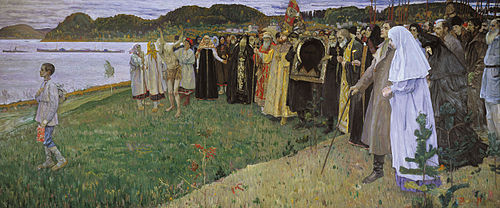
Back Sobornost Finnish Sobornost French Соборлық Kazakh 소보르노스티 Korean Sobornost Portuguese Соборность Russian Sabornost Serbo-Croatian Sobornosť Slovak Соборност Serbian Соборність (філософія) Ukrainian

Sobornost (Russian: собо́рность, IPA: [sɐˈbornəstʲ] "spiritual community of many jointly-living people")[1] is a Russian term whose usage is primarily attributed to the 19th-century Slavophile Russian writers Ivan Kireyevsky (1806-1856) and Aleksey Khomyakov (1804-1860). The term expresses the need for co-operation between people at the expense of individualism, on the basis that opposing groups focus on what is common between them. Khomyakov believed that the Western world was progressively losing its unity because it was embracing Aristotle and his defining individualism. Kireyevsky believed that G. W. F. Hegel and Aristotle represented the same ideal of unity.
Khomyakov and Kireyevsky originally used the term sobor (Russian: собор) to designate co-operation within the Russian obshchina, united by a set of common convictions and Eastern Orthodox values, as opposed to the cult of individualism in the West. The term sobor in Russian has multiple co-related meanings: a sobor is the diocesan bishop's "cathedral church"; a sobor is also a churchly "gathering", "assemblage", or "council", reflecting the concept of the Christian Church as an "ecclesia" (Greek: ἐκκλησία); secular civil Russian historical usage has the "Zemsky Sobor" (a national assembly) and various local (местное), landed or urban "sobors". Sobornost as an abstract noun formed on the basis of sobor thus literally means something like "gathering-ness" or "assembly-ness".
Khomyakov's concept of the "catholicity" of the Christian Church as "universality", in contrast to that of Rome, reflects the perspective from the root-meaning of the word "liturgy" (Greek: λειτουργία), meaning "work of the gathered people".
- ^ С. И. Ожегов и Н. Ю. Шведова, ТОЛКОВЫЙ СЛОВАРЬ РУССКОГО ЯЗЫКА / S. I. Ozhegov and N. U. Shvedova: Explanatory Dictionary of the Russian Language, ISBN 5902638070
© MMXXIII Rich X Search. We shall prevail. All rights reserved. Rich X Search